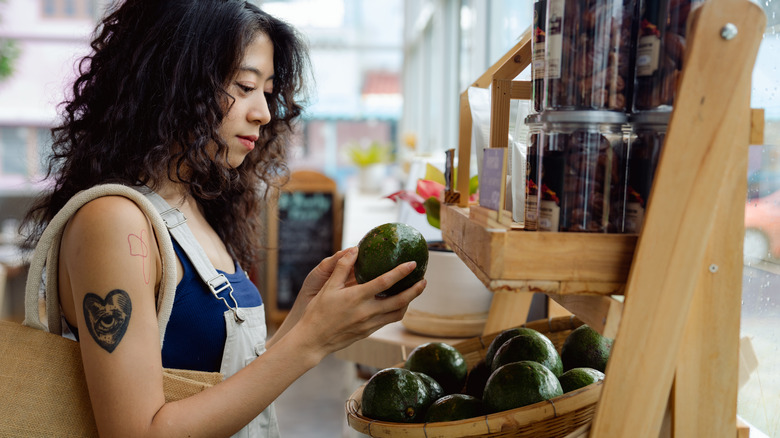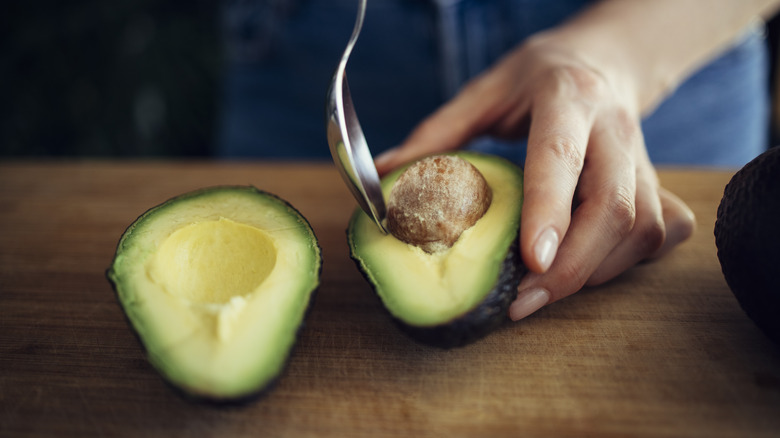Save Leftover Avocado Pits And Your Body Will Thank You Later
Instead of purchasing commercial tea bags at the store, many people take a DIY approach to their tea brewing. Whether you're adding in a squeeze of lemon, a dash of turmeric, or boiling in a few slices of ginger, there are plenty of everyday ingredients in your kitchen that may give your piping hot cup of tea an extra healthy boost. This includes the couple of alligator pears we'd bet are sitting in your fruit bowl right now — more lovingly known as avocados.
In 2022, Statista reported that the average person in the U.S. consumed approximately 9.22 pounds of avocado. Yet we'd be willing to wager that the majority of those avocado seeds probably wound up in the trash. Here's the good news: Instead of tossing leftover pits, you can give them a renewed sense of purpose by safely recycling them in the form of avocado seed tea.
Potential health benefits of avocado seeds
The nutrient content of avocados isn't limited to the creamy flesh of the fruit (yes, technically avocados are categorized as berries). 2022 research published in the scientific journal Food Chemistry: X outlines how avocado seeds contain health-promoting bioactive compounds. They are also high in proteins and various vitamins and minerals, including phosphorus, iron, calcium, potassium, zinc, copper, B vitamins, and more. This comes with a host of potential health benefits, with the vitamin content of avocado seeds having been linked to healthy vision, immunity, and blood flow. Registered dietitian Amy Shapiro told Well+Good that avocado seeds also possess antioxidant, antifungal, and antimicrobial properties. These mighty seeds may therefore support our cardiovascular health as well as our gastrointestinal health by helping to keep things moving in the gut.
By now, you're probably more than ready to grab your favorite mug and get to brewing. Before we break down the how-to of it all, it's important to note that further research is needed regarding the safety of avocado seed consumption. As Healthline notes, certain compounds in the seed are thought to pose potential health risks. People with avocado food allergies should avoid drinking avocado seed tea, and those taking prescription medications should first check with their physician regarding potential drug interactions.
How to DIY a cup of avocado seed tea
Prior to making avocado seed tea, you'll want to let the pit dry out for three days or more to protect against ingesting potentially dangerous chemicals. "If you don't have time to dry and boil the seeds, buying them is an easier option," registered dietitian Carmelita Lombera told For Women First. Just be sure to double check that the product is derived from the pit.
If you do have three days' worth of patience, however, the payoff may very well be worth the wait. Start by running the avocado seed under a stream of cool water before dropping it into a small pot or saucepan filled with 3 to 4 cups of water, and let it boil for 5 to 10 minutes. Pull off the skin and cut the pit up into small slices and give it another 10 minutes of boil time. Finally, remove the pot from the stovetop, strain the water into your cup, and voila. Don't be deterred if your tea appears pink; this is due to the seed's polyphenol content. It can also have a somewhat bitter taste, so if that isn't your cup of tea, so to speak, try adding a dab of honey or cinnamon to give it a sweeter flavor. To be on the safe side, limit consumption to just one cup of avocado seed tea daily.


